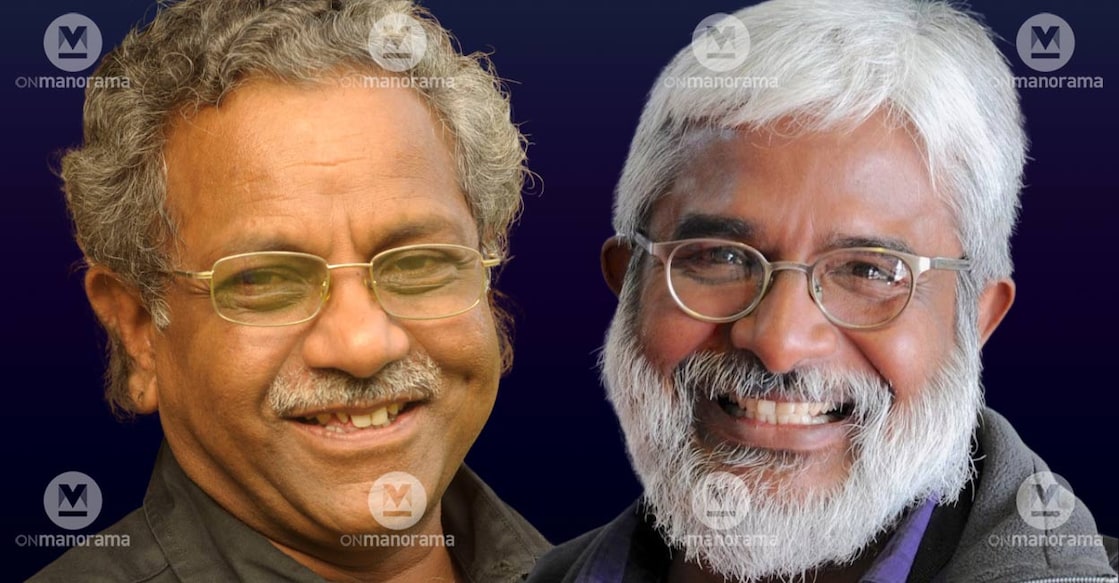How Shaji and Sunny Joseph created iconic opening passages of 'Piravi'

Mail This Article
After watching 'Piravi', the legendary filmmaker Mrinal Sen warmly embraced Shaji N Karun and told him that he had created one of world cinema's most haunting opening passages.
"Mrinalda said the opening moments of 'Piravi' terrified him. He said he knew right away that something horrific, something he could never bear, was about to happen," Shaji had later said.
'Piravi' was about an old father's eternal wait for his dead son. In the opening moments, nature behaves like an animal that has sensed an impending disaster. A mighty ocean. Darkening clouds. Birds in desperate flight. Swaying dark trees.
A crumbling, deserted house on the shore, trembling mouse-like before the ocean. Wind accelerating through tall grass like an invisible animal that has found its prey. A madly swaying board of a village library.

Open windows banging with a vicious thud. A man looking up at the sky like he has seen the devil descending. A terrified black cat squeezing into a pigeonhole-like space inside the library. The nearly two-minute shot ends with the frightened black eyes of the cat staring at the camera.
"We had not the slightest idea that this will turn out to be an iconic scene," said Sunny Joseph, the cinematographer of 'Piravi'. "Shaji Chettan wanted to evoke the dread of loss. We did not want rain, just the moments before a ferocious downpour when, as Shaji Chettan had put it, reptiles and birds are somehow told of the impending disaster," Joseph said.
But for this, Shaji wanted the nature in Kasaragod's Kanhangad and Nileshwaram areas to feel the foreboding of the father in his film. "We postponed the shooting twice because the weather did not sufficiently evoke the mood we wanted for the film," Joseph said. "I think it was in October (1988) that we finally managed to begin the shoot," he said.
Shaji wanted Joseph to be alert to "the fear of nature". The opening images were captured in between the main shooting schedules. Only the library scenes - in which the windows banged shut and two men and a cat looked horror-struck - were planned.

"Shaji Chettan wanted the cat to look at the camera. We managed to drive the cat into the narrow space, but we could not make it look at us. It was so frightened by the noises around that it curled up inside the narrow space. Shaji Chettan then asked me to make a 'meow' sound and the cat, perhaps thinking there was company for him, looked up at us," Joseph said.
Like the 'meow' that surprised the cat, Joseph, too, was given a surprise. "It was on the first day of the shoot that I was told that I am the cinematographer," Joseph said. He was Shaji's assistant cinematographer then.
Since Shaji was one of the country's finest cinematographers, Joseph was under the impression that he himself would work the camera for his debut venture. "I was, however, part of the discussion and location scouting for 'Piravi'. But I had no idea that Shaji Chettan had me in mind to do the camera work," Joseph said.
This way Joseph was spared of stress. "If I had known I was to be the cinematographer for Shaji Chettan's first film, I would have had sleepless nights. But by including me in all the discussions and keeping my larger role a secret, Shaji Chettan made sure that I knew all about the film but was kept away from all the unnecessary nervousness," Joseph said.
Nonetheless, when the climax was shot, nature did spring a surprise on both Shaji and Joseph. When it had to rain heavily, it did not. "We got hold of a pump used for agricultural purposes and sprayed water over the tiled roof of the house," Joseph said.
In the final scene, after the last bus of the day had come without his son, the father returns home. The loss of his son has unsettled the old man. In the unlit inside, he starts speaking to his dead son. Outside, it is raining heavily, water falling down like thick iron bars from the edges of the sloping roof of the house.


